Roundtable on Money and Finance•Spring 2017: Inclusive Finance and Credit System
2017-03-25 IMI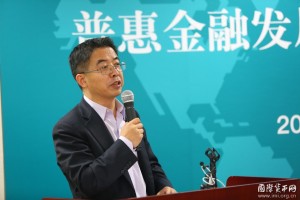 In his opening speech, Prof. Zhao Xijun introduced the basic situation of the discipline setting and research strength of the School of Finance, and reviewed past course and original intention of IMI. He welcomed all the participants to share their ideas and insights on the conference.
In his opening speech, Prof. Zhao Xijun introduced the basic situation of the discipline setting and research strength of the School of Finance, and reviewed past course and original intention of IMI. He welcomed all the participants to share their ideas and insights on the conference.
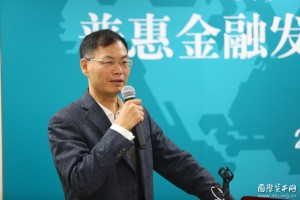 Mr. Wang Zhongmin talked about the unfavorable social credit environment and the phenomenon of credit chaos. He believes that the fundamental problem lies in the lack of credit capitalization during the transformation from planned economy to market economy. When credit cannot be quantified to each market entity and credit accumulation cannot bring real benefits to people, many people will use negative credit behavior for arbitrage, which result in the current credit system distortion. Credit is a private good, but negative credit is a public good, therefore, we should prevent negative credit behavior and maximize the community’s credit value.
Mr. Wang Zhongmin talked about the unfavorable social credit environment and the phenomenon of credit chaos. He believes that the fundamental problem lies in the lack of credit capitalization during the transformation from planned economy to market economy. When credit cannot be quantified to each market entity and credit accumulation cannot bring real benefits to people, many people will use negative credit behavior for arbitrage, which result in the current credit system distortion. Credit is a private good, but negative credit is a public good, therefore, we should prevent negative credit behavior and maximize the community’s credit value.
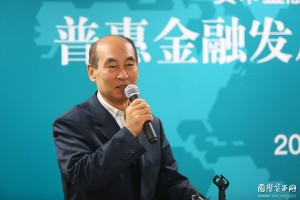 Prof. Chen Long delivered a keynote speech on the Development of China's Credit Market. He mentioned that Alipay was created to solve the problem of credit deficiency in transaction. He discussed in detail the relationship between credit and commercial civilization, economic progress and social governance mechanisms through the case of Ant Financial Services. In view of the current four problems, namely low coverage rate of credit market, structural imbalance, a single source of data and lack of credit supply, he put forward six proposals: enhancing the credit system infrastructure, multi-dimensional information collection, balancing efficiency and independence of credit bureaus, balancing credit industry development and privacy protection, credit card management system and evaluation mechanism for credit industry development.
Prof. Chen Long delivered a keynote speech on the Development of China's Credit Market. He mentioned that Alipay was created to solve the problem of credit deficiency in transaction. He discussed in detail the relationship between credit and commercial civilization, economic progress and social governance mechanisms through the case of Ant Financial Services. In view of the current four problems, namely low coverage rate of credit market, structural imbalance, a single source of data and lack of credit supply, he put forward six proposals: enhancing the credit system infrastructure, multi-dimensional information collection, balancing efficiency and independence of credit bureaus, balancing credit industry development and privacy protection, credit card management system and evaluation mechanism for credit industry development.
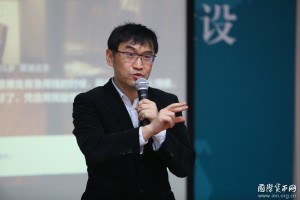 In his keynote speech, Prof. Wang Jun pointed out that inclusive finance does not just provide preferential financing conditions, but is intended to develop a commercially sustainable micro-financial form. If you start x- and y-axis at the point of high-income population’s earning and the city center, and set the individual income and his/her distance from the city center as the horizontal and vertical axis respectively, then the boundary of the financial institution's service outward expansion is the commercially sustainable boundary. Within the boundary, any financial institution that makes small loans or rural loans is profitable, and the government does not need to use incentives. He believes that when establishing the credit system, spillover efficiency and cost should be weighed, and credit industry development and privacy protection should be balanced.
In his keynote speech, Prof. Wang Jun pointed out that inclusive finance does not just provide preferential financing conditions, but is intended to develop a commercially sustainable micro-financial form. If you start x- and y-axis at the point of high-income population’s earning and the city center, and set the individual income and his/her distance from the city center as the horizontal and vertical axis respectively, then the boundary of the financial institution's service outward expansion is the commercially sustainable boundary. Within the boundary, any financial institution that makes small loans or rural loans is profitable, and the government does not need to use incentives. He believes that when establishing the credit system, spillover efficiency and cost should be weighed, and credit industry development and privacy protection should be balanced.
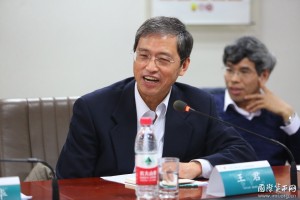 In the discussion session, Yang Dong said that the high integration of personality rights and property rights made the multi-dimensional data collection a must; Chen Weidong mentioned that financial sector first should serve social production, which was a firm foothold for developing an “inclusive” and “beneficial” inclusive finance; Guo Tianyong pointed out that poverty alleviation and inclusive finance were different concepts, and commercial banks could expand financial services through establishing inclusive finance department. Leveraging inclusive finance and internet finance could enhance the breadth and depth of commercial banking services to customers; Hu Xuehao said that inclusive finance was commercially sustainable under the government’s support and was designed to complement the current financial system; Guo Jianwei started with the Xiaokang Society and explained that fiscal policies could promote inclusive finance, and new technology could help inclusive financial promotion in the backward areas; Guan Wei talked about the practice of inclusive finance in Sichuan Province and the development of credit management disciplines at RUC.
In the discussion session, Yang Dong said that the high integration of personality rights and property rights made the multi-dimensional data collection a must; Chen Weidong mentioned that financial sector first should serve social production, which was a firm foothold for developing an “inclusive” and “beneficial” inclusive finance; Guo Tianyong pointed out that poverty alleviation and inclusive finance were different concepts, and commercial banks could expand financial services through establishing inclusive finance department. Leveraging inclusive finance and internet finance could enhance the breadth and depth of commercial banking services to customers; Hu Xuehao said that inclusive finance was commercially sustainable under the government’s support and was designed to complement the current financial system; Guo Jianwei started with the Xiaokang Society and explained that fiscal policies could promote inclusive finance, and new technology could help inclusive financial promotion in the backward areas; Guan Wei talked about the practice of inclusive finance in Sichuan Province and the development of credit management disciplines at RUC.

